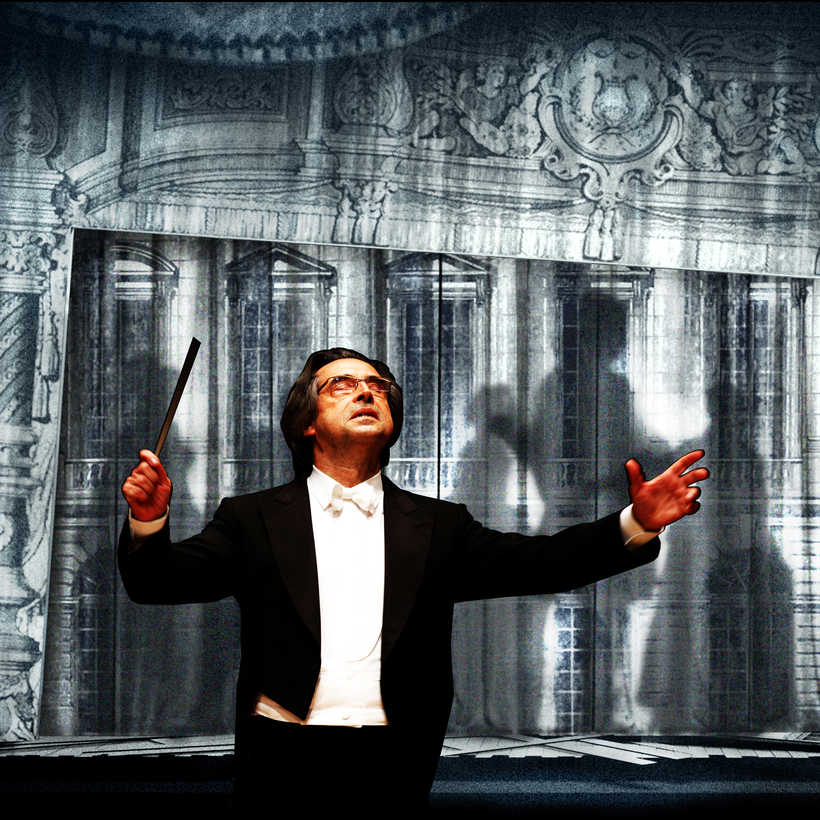To quiz Riccardo Muti on the music he loves is to release a genie from a bottle. Where others see ink spots on a page, Muti finds cosmic implications.
Take the second and fourth bars of the Don Giovanni overture, where all the higher-pitched instruments cut off after a single beat while the bassoons and the low strings hang on for two. “Some think the longer notes are just a mistake,” Muti said on a recent call from his home in Ravenna, the ancient capital of the Western Roman Empire. “I say that extra sound is the sound of hell, rumbling underground beneath the apse of a church.”
Don Giovanni—the second of three masterpieces Mozart composed to libretti by the poet, priest, and adventurer Lorenzo Da Ponte—has been a Muti specialty since 1987, when he conducted Giorgio Strehler’s landmark production at the Teatro alla Scala, in Milan. This month, at 81, he leads the fourth new production of his career, directed by his daughter Chiara Muti for the Teatro Regio, Turin. Luca Micheletti, fourth generation in a family of strolling players of the sort Leoncavallo immortalized in Pagliacci, takes the title role of the notorious serial seducer.
Recalling Milan, Muti describes the Strehler vision of night and shadows as “funereal, more dramma than giocoso,” giocoso being the adjective form of gioco: literally a game, and by extension a joke. Dramma giocoso, an established genre in Mozart’s time though few examples survive today, indicates a serious show with funny stuff. Don Giovanni opens with sexual assault and murder. In the finale, the “hero” plunges screaming into the fiery pit. Still, along the way, there’s plenty of comic relief. The art is in how you tilt the balance.
“The key is already in the overture,” Muti says. “It starts in the dramatic tonality of D minor—the tonality of Mozart’s Requiem, pounding like destiny. But very quickly comes the allegro, which could be considered giocoso, flying from one tonality to another to another like a butterfly flying from flower to flower, but never satisfied, never finding a place to stop and rest. That’s Don Giovanni, chasing from one woman to another to another. He has his catalogue. What matters is adding names to his list. What matters is numbers.” According to his sidekick, Leporello, Don Giovanni has 2,065 notches on his belt—1,003 in Spain alone.
“This gioco that never stops,” Muti continues, “in the end, it’s an unhappy one, a gioco without a smile. So, between the tragedy and the pleasure, the overture gives us a sense of anxiety. It holds the key to Don Giovanni’s character. He’s not a conqueror and a winner but someone desperate, a loser.”
Yet still, he’s the hero? “He’s like Lucifer, whose name means ‘the bringer of light.’ He was conceived in the mind of God for good. But he turned away from God and became the Devil. Still, he brings light, but a light that’s sinister. Without Don Giovanni, life is flat. No one knows what to do.
“That’s what we see in the finale. Donna Anna postpones her wedding—again, leaving poor Don Ottavio back out in the cold. Donna Elvira decides to live out her life in a convent. Zerlina and Masetto go home to have dinner, with nothing to look forward to. It’s worst of all for Leporello, who was always trying to learn Don Giovanni’s tricks but winds up hoping he can just find a ‘better’ boss. What a betrayal! When Don Giovanni is gone—when evil has ceased to exist—we’re all lost.
“‘Questo è il fin di chi fa mal,’ the survivors all sing at the very end. ‘This is how a wicked person ends.’ But is it just Don Giovanni? What about all those ‘good,’ ‘honest’ people? Aren’t they wicked, too? Will we all end up the way Don Giovanni did? At the end of their operas, Mozart and Da Ponte always leave us in doubt.”
Don Giovanni will be on at Teatro Regio from November 16 through November 26
Matthew Gurewitsch writes about opera and classical music for AIR MAIL. He lives in Hawaii

